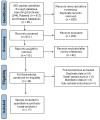Tinnitus-associated cognitive and psychological impairments: a comprehensive review meta-analysis
- PMID: 38389785
- PMCID: PMC10881733
- DOI: 10.3389/fnins.2024.1275560
Tinnitus-associated cognitive and psychological impairments: a comprehensive review meta-analysis
Abstract
Background: Tinnitus is strongly associated with an increased risk of cognitive disabilities. The findings of this research will provide valuable support for future investigations aimed at determining the correlation between tinnitus and the risk of cognitive impairments.
Objectives: We investigated the potential correlation between tinnitus and the risk of various cognitive impairments, such as dementia, compromised learning attention, anxiety, depression, and insomnia. The study examined this relationship collectively and by categorizing the data based on different age groups.
Methods: We compiled data from case-control studies and cohort studies obtained from reputable databases such as PubMed, Cochrane Library, and Embase. To minimize potential bias, two reviewers independently assessed the selected articles. After extracting the data, we calculated the pooled odds ratios (ORs) using a random-effects model.
Results: Seventeen relevant studies, comprising an adult population, were included in this analysis. Pooled estimated outcomes revealed a strong association between tinnitus and an elevated risk of dementia-compromised learning, auditory attention, anxiety, depression, and poor sleep quality (P<0.05). Furthermore, the pooled analysis stratified by age demonstrated that patients aged above 60 years, in comparison to those aged 18 to 60 years, exhibited more significant outcomes in relation to the progression of cognitive impairments.
Conclusion: Tinnitus has the potential to increase the risk of cognitive impairments. Moreover, geriatric patients aged above 60 shows a higher susceptibility to developing cognitive disabilities compared to their younger counterparts.
Keywords: Alzheimer's disease; anxiety; attention deficit disorder; cognitive and psychological impairments disorders; dementia; learning and auditory attention; poor sleep quality; tinnitus.
Copyright © 2024 Yang, Zhang, Zhang and Li.
Conflict of interest statement
The authors declare that the research was conducted in the absence of any commercial or financial relationships that could be construed as a potential conflict of interest.
Figures









Similar articles
-
Age-related hearing loss and tinnitus, dementia risk, and auditory amplification outcomes.Ageing Res Rev. 2019 Dec;56:100963. doi: 10.1016/j.arr.2019.100963. Epub 2019 Sep 23. Ageing Res Rev. 2019. PMID: 31557539 Review.
-
Deployment of personnel to military operations: impact on mental health and social functioning.Campbell Syst Rev. 2018 Jun 1;14(1):1-127. doi: 10.4073/csr.2018.6. eCollection 2018. Campbell Syst Rev. 2018. PMID: 37131363 Free PMC article.
-
Sound therapy (using amplification devices and/or sound generators) for tinnitus.Cochrane Database Syst Rev. 2018 Dec 27;12(12):CD013094. doi: 10.1002/14651858.CD013094.pub2. Cochrane Database Syst Rev. 2018. PMID: 30589445 Free PMC article.
-
Cognitive behavioural therapy for tinnitus.Cochrane Database Syst Rev. 2020 Jan 8;1(1):CD012614. doi: 10.1002/14651858.CD012614.pub2. Cochrane Database Syst Rev. 2020. PMID: 31912887 Free PMC article.
-
Structural magnetic resonance imaging for the early diagnosis of dementia due to Alzheimer's disease in people with mild cognitive impairment.Cochrane Database Syst Rev. 2020 Mar 2;3(3):CD009628. doi: 10.1002/14651858.CD009628.pub2. Cochrane Database Syst Rev. 2020. PMID: 32119112 Free PMC article.
Cited by
-
Bridging the Gap between Psychophysiological and Audiological Factors in the Assessment of Tinnitus: An EEG Investigation in the Beta Band.Brain Sci. 2024 Jun 3;14(6):570. doi: 10.3390/brainsci14060570. Brain Sci. 2024. PMID: 38928570 Free PMC article.
-
Impact of short-term tinnitus treatment on cognitive function and neural synchronization.Front Neurol. 2025 Feb 26;16:1478033. doi: 10.3389/fneur.2025.1478033. eCollection 2025. Front Neurol. 2025. PMID: 40078174 Free PMC article.
-
Astrocytes and Tinnitus.Brain Sci. 2024 Nov 29;14(12):1213. doi: 10.3390/brainsci14121213. Brain Sci. 2024. PMID: 39766412 Free PMC article. Review.
-
Changes in Perceived Tinnitus Sound Qualities Following Internet-Based Cognitive Behavioral Therapy for Tinnitus.Clin Pract. 2025 Mar 27;15(4):69. doi: 10.3390/clinpract15040069. Clin Pract. 2025. PMID: 40310299 Free PMC article.
References
Publication types
LinkOut - more resources
Full Text Sources

